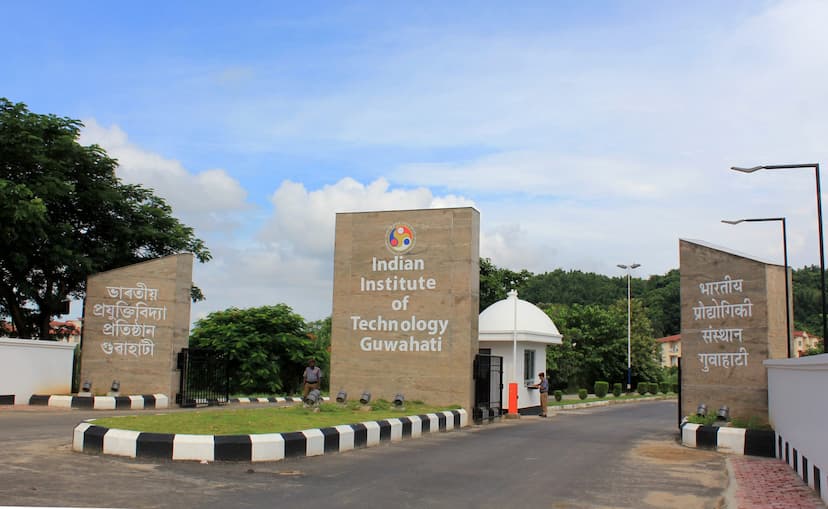IIT Guwahati 2020: Working with ICL for making great LEDs brighter

IIT Guwahati researchers in association with Imperial College London (UK) have developed a tailored ‘meta-grid’ of nanoparticles that could make light-emitting diodes (LEDs) brighter, energy-efficient and durable.
‘Meta-grid’ or ‘metamaterial grid’ is a specifically patterned array (grid) of nanoparticles acting as metamaterials, capable of exhibiting extraordinary optical properties.


An increase in LED light output would significantly reduce energy needs on a large scale and therefore, will contribute towards curbing global warming and climate change.
Over the years, a significant research drive towards this objective is in exploring new materials for LED-chip encapsulation, mostly by deploying either higher refractive index glasses or epoxy materials incorporated with filler powders or nanoparticle-loaded-epoxy or engineered epoxy resins, etc.
However, these techniques either makes the LED chips bulkier or their fabrication becomes more challenging and less economically viable for mass production.

Towards this goal, Dr. Debabrata Sikdar, Assistant Professor, IIT Guwahati along with Professor Sir John B. Pendry and Professor Alexei A. Kornyshev from Imperial College London has developed a nanoparticle ‘meta-grid,’ which needs to be placed at an appropriate location within the epoxy casing of the LEDs, for improving light output from LEDs.
A ‘meta-grid’ is a specially-designed, optimised, two-dimensional array of specific nanoparticles, of size much smaller than the wavelength of light.
The findings made by researchers of IIT Guwahati Imperial College London have been published in ‘Light: Science & Applications journal’ of the Nature Publishing Group.

Apply Now For – Amity University, Gwalior Madhya Pradesh
While prescribing minimal changes to the manufacturing process, the research team has developed this novel scheme of boosting transmission of light generated inside an LED chip across the LED-chip/encapsulant interface.
This is achieved by reducing the Fresnel reflection loss at the chip/encapsulant interface, within a fixed photon escape cone, based on tuning the destructive interference phenomena with help of the ‘meta-grid’.
The technique has revealed optimal design parameters for such meta-grids to produce greater light output over any narrow/broadband emission spectrum, besides boosting LEDs’ lifetime by eliminating heating of the chip from unwanted reflections within the chip.

The technique is deployable by itself or in combination with other existing techniques applied for increasing LED’s efficiency.
The entire original theoretical framework needed for the invention has been developed in-house and is rigorously tested against standard commercial simulation tools.

The theoretical models, developed by Dr. Sikdar and his collaborators, allow finding out the optimal conditions for the design of the nanoparticle ‘meta-grid’ layer.
Material and composition of nanoparticles and parameters, such as their sizes, average interparticle spacing and the distance from the surface of the LED chip, are optimised to achieve the maximum enhancement in light extraction from the LED chip into its encapsulating casing, over any emission spectral range of a typical LED.
Speaking about the research work done by team of IIT Guwahati and Imperial College London Dr. Debabrata Sikdar said With the continuous advancement in nanofabrication technology, it is now possible to fabricate metallic nanoparticles which are mostly monodisperse or having a very narrow spread.
Still, there could always be some randomness in particle size and/or position, flatness of grid, and variation in refractive index due to fabrication error or material defects, which are unavoidable.
Effects from most of these inaccuracies can be estimated from our tolerance study and it has shown the robustness of our scheme, said Debabrata Sikdar of IIT Guwahati.
Debabrata of IIT Guwahati further said In this invention, the effects of the ‘meta-grid’ on the standard commercial LEDs, based on group III–V materials are demonstrated.
However, the proposed concept of enhancing light transmission from an emissive layer to its encapsulant casing can be extended to other types of light emitting devices hosting an emissive-layer/encapsulant interface, he said.
Generally, our nanoparticle ‘meta-grid’ scheme for enhanced light extraction could potentially cater to a wider range of optical gadgets, not just semiconductor LEDs, he said.
Speaking more about the work of research teams from IIT Guwahati and Imperial College London Professor Alexei A. Kornyshev said there could be different engineering solutions for the meta-grids in the LED-chips.
One of them would be to use drying-mediated self-assembly of nanoparticles, e.g. made of silver or alternative less-lossy plasmonic materials capped with appropriate ligands, to form free-standing the Sikdar–Premaratne–Cheng ‘plasmene’ sheets.
Those nanoparticle monolayer sheets could be made stretchable for precise tuning of the interparticle separation and then stamped on the LED chip before the encapsulating casing is fabricated.

Professor Sir John B. Pendry the simplicity of the proposed scheme and the clear physics underpinning it should make it robust and hopefully, easily adaptable to the existing LED manufacturing process.
It is obvious that with larger light extraction efficiency, LEDs will provide greater energy savings as well as longer lifetimes of the devices, said Professor Sir John B. Pendry.
The research team from IIT Guwahati and Imperial College London believes that the work will definitely have a global impact on the versatile LED based applications and their multi-billion-dollar market worldwide.
About IIT Guwahati
IIT Guwahati established in 1994 has completed 25 years of glorious existence in 2019.
At present, the Institute has eleven departments and five inter-disciplinary
The Institute offers a residential campus to 412 faculty members and more than 6,000 students at present. Besides its laurels in teaching and research, it has been able to fulfil the aspirations of people of the North East region to a great extent since its inception in 1994.
The picturesque campus is on a sprawling 285 hectares plot on the north bank of the Brahmaputra, around 20 kms from the heart of the Guwahati city.
IIT Guwahati is the only academic institution in India that occupied a place among the top 100 world universities – under 50 years of age – ranked by the London-based Times Higher Education (THE) in the year 2014 and continues to maintain its superior position even today in various International Rankings.
The Institute has been ranked at 6th position in ‘India Overall Rank’ and 350th position under the ‘World Overall Rank’ categories released by Nature Index for the year 2020. Along with the seven other institutes, IIT Guwahati has been ranked below 500 in the QS World ranking released recently.
IIT Guwahati has retained the 7th rank among the best engineering institutions of the country in the ‘India Rankings 2020’ and also achieved the best ever rank of #7 in the ‘Overall’ category this year (2020) declared by National Institutional Ranking Framework (NIRF) of the Union ministry of Human Resource Development (HRD) in June 2020.
S Vishnu Sharmaa now works with collegechalo.com in the news team. His work involves writing articles related to the education sector in India with a keen focus on higher education issues. Journalism has always been a passion for him. He has more than 10 years of enriching experience with various media organizations like Eenadu, Webdunia, News Today, Infodea. He also has a strong interest in writing about defence and railway related issues.






